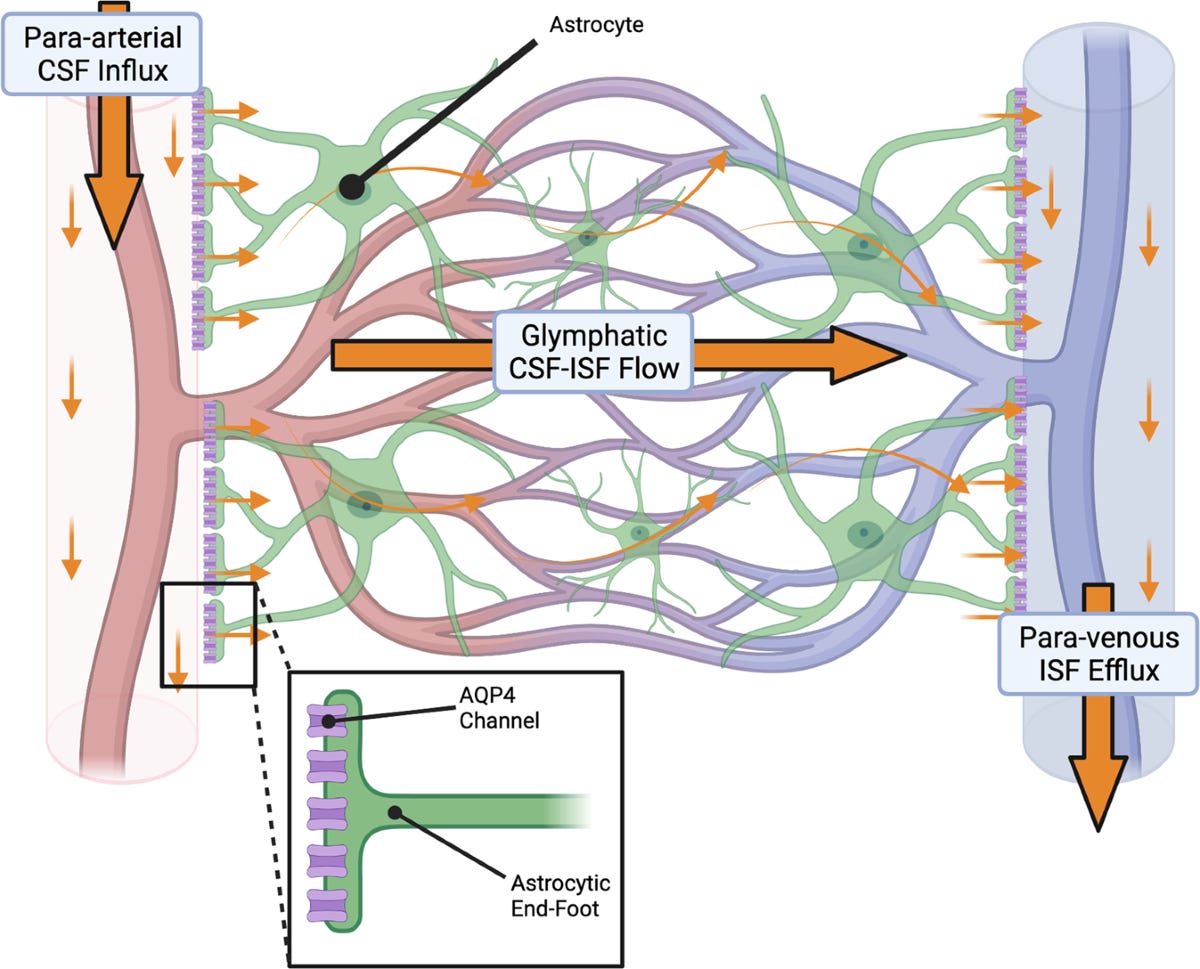How the Glymphatic System Powers Waste Clearance During Sleep
Unlocking the Brain's Cleaning System
When we think about sleep, we often focus on its restorative benefits—rejuvenating our muscles, consolidating memories, or simply refreshing us for a new day.
However, a vital, lesser-known function of sleep is its role in brain health, specifically how the brain clears out waste. This critical task is handled by a unique system known as the glymphatic system.
In recent years, researchers have uncovered how this system works and why it plays an essential role in maintaining cognitive health and preventing neurodegenerative diseases.
What Is the Glymphatic System?
The glymphatic system is a network in the brain responsible for clearing waste products, including toxins and byproducts of cellular activity, through a system of fluid channels.
It was discovered in 2012 by Danish neuroscientist Maiken Nedergaard, revolutionizing our understanding of brain maintenance. Named after the glial cells that support its function (hence "glymphatic"), this system mirrors the lymphatic system in the rest of the body but is uniquely adapted for the brain's specialized needs.
In simple terms, the glymphatic system acts like a brain "garbage disposal."
It flushes cerebrospinal fluid (CSF) through brain tissue, removing waste products and delivering them to the body’s waste-clearing organs for disposal.
Why Sleep Is Crucial for Glymphatic Function
The glymphatic system becomes most active during sleep, particularly deep, non-REM (slow-wave) sleep. During wakefulness, the system operates minimally, but as we fall into deep sleep, brain cells shrink, expanding the space between them by up to 60%.
This expansion allows cerebrospinal fluid to flow more freely and sweep away harmful waste products more efficiently.
How Glymphatic Dysfunction Relates to Brain Disorders
The glymphatic system’s ability to clear toxins is integral to maintaining a healthy brain, and when this system becomes compromised, the consequences can be severe.
Dysfunction in the glymphatic system is increasingly linked to a range of neurological disorders, including:
Alzheimer’s Disease: As mentioned, beta-amyloid accumulation is a hallmark of Alzheimer’s, and disrupted glymphatic activity may accelerate this process.
Parkinson’s Disease: Research indicates that the glymphatic system also clears alpha-synuclein, a protein implicated in Parkinson’s disease.
Traumatic Brain Injuries (TBI): Head injuries can cause damage to the glymphatic system, leading to impaired waste clearance and long-term cognitive deficits.
Stroke: In stroke patients, decreased glymphatic function may exacerbate brain swelling and impede recovery by slowing the removal of inflammatory waste products.
The glymphatic system may also play a role in conditions like chronic traumatic encephalopathy (CTE), a disease linked to repeated head trauma that has been identified in many athletes, especially in contact sports like football and boxing.
The Role of Sleep and Lifestyle in Enhancing Glymphatic Function
Maintaining a well-functioning glymphatic system isn’t just about avoiding neurodegenerative diseases. It's also tied to day-to-day cognitive performance, memory retention, and overall brain health.
Here are key ways to support your glymphatic system and ensure optimal brain health:
Prioritize Sleep: Since the glymphatic system is most active during deep sleep, it’s critical to make sure you are ASLEEP before 10 PM so that you’re able to maximize this phase of deep sleep.
Sleep on Your Side: Interestingly, studies in animals suggest that sleeping on your side may promote better glymphatic clearance compared to sleeping on your back or stomach. While more research is needed in humans, this may be a simple way to enhance brain waste clearance.
Exercise Regularly: Exercise has been shown to promote the flow of cerebrospinal fluid, which could enhance glymphatic function. Physical activity also improves sleep quality, further supporting brain health.
Stay Hydrated (With Mineralized Spring Water): Dehydration can negatively affect cerebrospinal fluid production, reducing glymphatic efficiency. Make sure to drink enough mineralized spring water daily to support this crucial system. Aim to consume a minimum of half your bodyweight in ounces. Increase this amount if you’re sweating a lot and live in a hot environment.
Avoid Excessive Alcohol Consumption: Chronic alcohol use has been found to impair glymphatic function, reducing the brain’s ability to remove toxins. Moderating alcohol intake or completely removing it from your life will help preserve your brain’s cleaning mechanisms.
Conclusion
The discovery of the glymphatic system has reshaped our understanding of brain health and the role of sleep in waste clearance. Ensuring that we get sufficient, high-quality sleep is not just about feeling rested—it’s a fundamental part of maintaining cognitive function, preventing neurodegenerative diseases, and supporting long-term brain health.
By giving your brain the chance to clear out the waste it accumulates during the day, you're not only protecting it for the future but also optimizing your mental clarity and overall well-being today.
So tonight, as you drift into sleep, remember that your brain is hard at work, cleaning up, regenerating, and preparing you for the challenges ahead.
Early to wake and early to rise never fails.
Sources:
Iliff, Jeffrey J., et al. "A Paravascular Pathway Facilitates CSF Flow Through the Brain Parenchyma and the Clearance of Interstitial Solutes, Including Amyloid β." Science Translational Medicine, 2012.
Xie, Lulu, et al. "Sleep Drives Metabolite Clearance from the Adult Brain." Science, 2013.
Plog, Benjamin A., and Maiken Nedergaard. "The Glymphatic System in Central Nervous System Health and Disease: Past, Present, and Future." Annual Review of Pathology: Mechanisms of Disease, 2018.
Lundgaard, Iben, et al. "Glymphatic Clearance Controls State-Dependent Changes in Brain Lactate Concentration." The Journal of Cerebral Blood Flow & Metabolism, 2017.
Holth, Julius K., et al. "The Sleep-Wake Cycle Regulates Brain Interstitial Fluid Tau in Mice and CSF Tau in Humans." Science, 2019.










what do you make of THIS
https://x.com/chenkojira/status/1859658593588613336
Thank you! Very good. lymphatics are so underrated!